Veterinary Services
Pet Microchipping
At Conestoga Animal Hospital, in Ephrata, PA, we offer comprehensive pet microchipping services to ensure your pet’s safety and increase the chances of a quick reunion if they go missing.
What is Pet Microchipping?
Key Services and Benefits at Conestoga Animal Hospital
- Professional Microchipping Services: Our experienced veterinarians perform the microchipping procedure safely and efficiently.
- Comprehensive Pet Care: We offer a full range of veterinary services to ensure the health and well-being of your pets.
- Friendly and Knowledgeable Staff: Our team is dedicated to providing compassionate care and answering any questions you may have about the microchipping process.
- Convenient Location: Located in Ephrata, PA, Conestoga Animal Hospital is easily accessible for pet owners in the area.

Benefits of Pet Microchipping
Permanent Identification
Pet microchips provide a permanent form of identification that cannot be removed or lost. Unlike collars and tags that can fall off or become damaged, a microchip remains with your pet throughout their life.
Quick and Painless Procedure
The microchipping process is quick and causes minimal discomfort. It is similar to a routine vaccination and does not require anesthesia. Most pets experience little to no pain during the procedure and do not notice the chip once it is in place.
Increased Chances of Recovery
Pets with microchips are significantly more likely to be reunited with their owners if they become lost. Statistics show that dogs with microchips are returned to their owners more than 50% of the time, while cats are returned nearly 40% of the time. This is a considerable increase compared to non-microchipped pets.
Use as a Lifetime Dog License
When to Consider Pet Microchipping
New Pet Adoption
Moving to a New Area
If you are moving to a new area, microchipping your pet can help ensure they are identified and returned to you if they get lost in unfamiliar surroundings. Remember to update your contact information in the pet recovery database after moving.
Travel Plans
If you plan to travel with your pet, especially internationally, microchipping is often a requirement. Many countries and airlines require pets to be microchipped before travel to ensure proper identification and compliance with regulations.
Outdoor Pets
How Pet Microchipping Works
- The Microchipping Process: The process of microchipping your pet at Conestoga Animal Hospital is simple and straightforward. During your visit, a veterinarian will use a hypodermic needle to implant the microchip just beneath your pet’s skin. The procedure is quick and does not require any special preparation or recovery time.
- Registration and Database: After the microchip is implanted, it is crucial to register your pet’s microchip with your contact information in a pet recovery database. Our staff will guide you through the registration process, ensuring that all information is correctly entered and up to date. Keeping your contact information current is essential for the microchip to be effective.
- Scanning and Identification: If your lost pet is found, veterinarians, animal shelters, and animal control officers can use a special scanner to detect the microchip. The unique identification number is then used to retrieve your contact information from the database, allowing them to contact you quickly.
